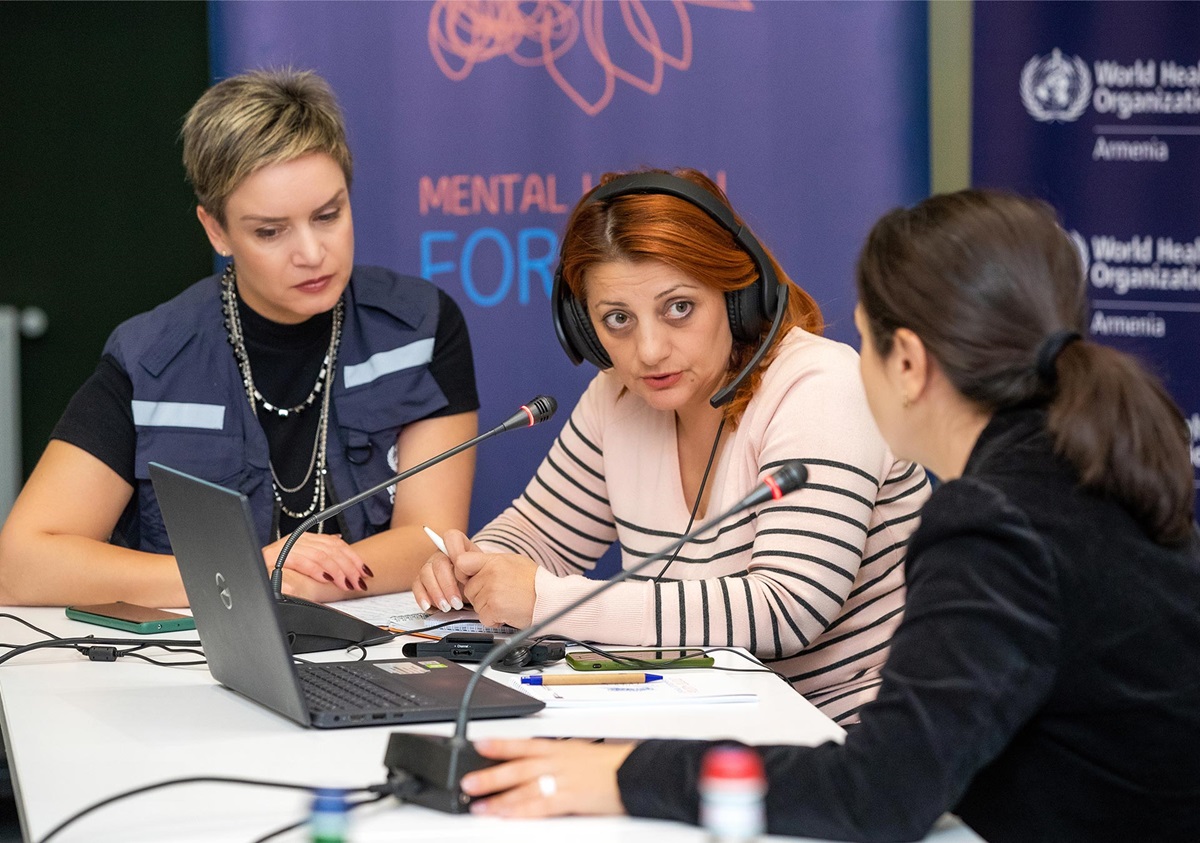
The work of psychologists at an Armenian telephone counseling service
“When the phone rings, I’m always excited,” says psychologist Lusine Babayan. “Who is calling? What kind of questions will he or she ask? What kind of problems will this person tell me about?”
Lusine is one of ten staff members who answer calls at the psychological and psychosocial support hotline with support from the WHO Country Office in Armenia. To better support callers, she and her colleagues received special training from relevant WHO experts in October 2023. Since then, they have been working in shifts, listening and connecting callers who are suffering from anxiety, depression or even suicidal thoughts.
The number was originally set up in 2020 to support health workers fighting the COVID-19 pandemic, but was later repurposed to support people affected by the crisis in the Karabakh region. However, the mass exodus to Armenia in September 2023 and the horrific explosion at a fuel depot that killed around 220 people and left another 300 severely burned have left many people in need of mental health care. Between September and December 2023, the helpline received a total of 1,108 calls, reflecting the cumulative impact of these crises. Today, the helpline is open to anyone who needs it. Currently, around half of callers are recent refugees, and 60% are women.
Providing the support needed
Psychologist Lilit Baghdasaryan, chairwoman of a non-governmental organization called AMBRA Mental Well Being Center, also works for the hotline. “Sometimes people come to us and say they don’t know where to start,” she says. “We tell them that if they turn to a specialist, they have solved 60% of the problem.”
“In some cases, talking to family and friends is enough, and that is important in itself, but sometimes people also need professional help,” confirms Marietta Khurshudyan, clinical psychologist and national adviser for mental health care and psychosocial support at the WHO Country Office in Armenia. “In cases of real distress, such as depression, high levels of stress, panic attacks or suicidal thoughts, people need a certain level of follow-up and support that can only be provided by a qualified psychologist.”
Callers who need more help can be referred to psychological services at special centres in the capital Yerevan. The hotline also works in parallel with the WHO Country Office in Armenia’s other relevant programmes: a multidisciplinary mobile mental health team that carries out visits to affected areas where psychological services are scarce, and ongoing psychological support for people with physical and psychological injuries as a result of the gas depot explosion. Group therapy sessions are also planned, including family members of people who have suffered lifelong burn injuries.
Far-reaching psychological effects of the refugee crisis
“Initially, the displaced people had no time to think about the psychological aspect of the situation. The overwhelming feeling among them was simply relief that they were alive, that they had survived,” says Lusine.
During this first phase of the refugee crisis, many callers used the emergency number to obtain social support, such as help with obtaining accommodation and food. But now that the critical phase of the emergency is over, the psychological impact of the experience is clearly felt.
“The problems and the way they are perceived have changed,” adds Lusine. “Now, more existential problems are coming to the fore in terms of the uncertainty of their future.”
Many of the female refugees who call the hotline were previously socially and professionally active in Karabakh and are now feeling the pain of the loss of their former lives. The team encourages women to contact the helpline not only to receive psychological support, but also practical advice that could open up professional and social opportunities.
“In my opinion, there are many women all over the world who put children, partners, family and elderly parents first and put their own needs aside. But we must not neglect our own mental health. So my appeal to everyone: dear women, take care of yourselves! I tell myself this every day – that I have to take care of myself. I really have to put myself first. It’s like on an airplane – put on your own oxygen mask first before helping the child. You have to be able to breathe, both mentally and physically. You simply need this strength to be able to carry on.”
She emphasizes that seeking help is important not only for the individual but for society as a whole: “If someone does not have the inner strength to recover, he cannot fully participate in social life, he cannot be creative, he cannot work, he cannot act proactively.”
Dr Marthe Everard, Special Representative of the WHO Regional Director for Europe in Armenia, added:
“Providing mental health care and psychosocial support as part of humanitarian response pays off, not only because it enables displaced people to survive extreme hardship, but also because it contributes to the reconstruction of a country.”
To support hotline staff in the emotional and practical processing of complex conversations, regular supervision sessions are offered to enable them to debrief in confidence and ensure continuous learning.
Contribute to reducing the stigma of mental health problems
As the hotline can be accessed from anywhere in Armenia, it is an important service for people in remote areas or those who cannot access face-to-face support due to caregiving responsibilities, as is the case for many women. The anonymity of the hotline helps ensure confidentiality for those who find their mental health problems stigmatizing.
“Thanks to the active work of psychological services, people began to understand that it is normal to turn to a psychologist,” says Lusine. “For fear of stigmatization, people wait, suffer too long and thus accept a deterioration in their quality of life. When they finally seek professional help, they often find that many problems could have been solved much faster if they had come forward earlier.”
A thought that makes her colleague Lilit happy.
“When I hear the phone ring, on the one hand I know that I might hear a difficult story,” she says. “But on the other hand, I’m kind of happy that someone is getting the help they desperately need from us.”

Ethel Purdy – Medical Blogger & Pharmacist
Bridging the world of wellness and science, Ethel Purdy is a professional voice in healthcare with a passion for sharing knowledge. At 36, she stands at the confluence of medical expertise and the written word, holding a pharmacy degree acquired under the rigorous education systems of Germany and Estonia.
Her pursuit of medicine was fueled by a desire to understand the intricacies of human health and to contribute to the community’s understanding of it. Transitioning seamlessly into the realm of blogging, Ethel has found a platform to demystify complex medical concepts for the everyday reader.
Ethel’s commitment to the world of medicine extends beyond her professional life into a personal commitment to health and wellness. Her hobbies reflect this dedication, often involving research on the latest medical advances, participating in wellness communities, and exploring the vast and varied dimensions of health.
Join Ethel as she distills her pharmaceutical knowledge into accessible wisdom, fostering an environment where science meets lifestyle and everyone is invited to learn. Whether you’re looking for insights into the latest health trends or trustworthy medical advice, Ethel’s blog is your gateway to the nexus of healthcare and daily living.



